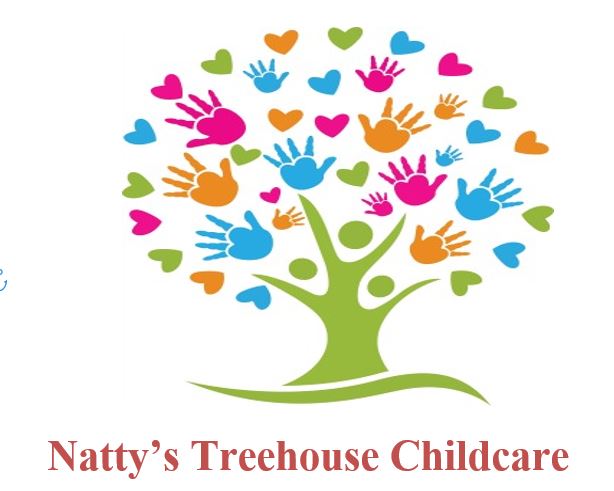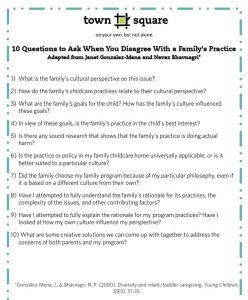While the informal setting of family child care can feel much warmer than a typical business, at the end of the day it is a source of income and a profession. As the owner of a family child care home, you’ll learn about marketing, advertising, accounting, and so much more.
Nonviolent communication is “a language of compassion.” While we don’t often think of our words, or anyone else’s, as violent, the emotional harm that we do to others and have done to us is real. Once we can accept that all behavior from children is communication, we are ready to take on a bigger challenge: learning and internalizing that behavior in the form of spoken, written, and body language from adults is communication too.
Because of the close personal nature of our work, it’s almost inevitable that at some point we will have a disagreement with a family member. But these disagreements don’t have to cause long-term damage to relationships. When we are skilled in nonviolent communication, we can strengthen our relationships with families through compassionate and thoughtful conversations, even when the conversations themselves are uncomfortable.
Consider a common source of tension between families and providers: when a child is too ill to attend child care, or becomes ill during the day.
From the provider’s perspective, one ill child will lead to more ill children, and when the care is provided in your home, it can impact your whole family. That might mean your children are sick, or you have to spend even more time cleaning and sanitizing than usual. It makes group care difficult: a sick child won’t want to play, won’t be in a cooperative mood, and may throw off the group routine with heightened need for sleep.
From the family’s perspective, a sick child may mean missing work when they are out of paid leave or in a probationary period. It can be harder to see that a child is ill when they are at home; it’s easier to meet the child’s needs individually rather than in a group setting, and the child is more comfortable at home and may just be happier with their family then they were at child care. Families who are stressed financially might be upset that they are paying for time they can’t use.
Making the call can be anxiety-inducing. Some providers might prefer to avoid the conflict altogether, and not say anything, or passively suggest that the family “keep an eye on” the child for symptoms. Other providers might start on the attack “Why did you send your child here when they’re clearly sick?!” Using non-violent communication urges a different path: First, try to anticipate the other person’s needs. While you can’t make a difference in how the person’s employer will respond to them needing to leave early to pick up a sick child, you can start with empathy. Then state your own need clearly.
“Hi Johanna; I’m sorry to interrupt you at work, I know you just started your new job. I’m calling to let you know that Jamari is running a fever and will need to be picked up before nap time. After he’s been fever-free for 24 hours, we’ll be excited to welcome him back!”
When you begin by acknowledging the other party’s needs, it tells them that you’re aware of what you’re asking. Following by phrasing your own needs clearly and in a positive way (i.e. with a direction, not just “don’t bring him back until he’s better) allows the other person to understand what is expected of them and plan accordingly. Finishing with a personal message also helps to convey that this isn’t a decision you made because you don’t want the child there, but because he’s uncomfortable and you have the responsibility of reducing the risk of contagious illness for all children in your care.
Using the framework of nonviolent communication reduces the room for misunderstandings and for professional boundaries to become personal. You can even use these practices when writing policies– another way to proactively anticipate conflict with families and clarify each party’s responsibilities in the child care setting.
One of the most significant challenges many providers face is ending the workday and giving yourself time off. Given your workplace is your home, it can feel like you are working all day and can’t take time off.
It is essential, especially during a stressful time, to take time for our mental health and be away from work. Having clear boundaries can help set the expectation of the importance of your time. Natalie Harrison, a family child care professional, and owner of Natty’s Treehouse Childcare in Muncie IN, shares the time boundaries she created for her business. She communicates these boundaries with families using her handbook; in doing so, families agree to her time limits.
Hours of operations – hours your business is open. Within that time, set time restrictions for how long a child/family can be in your care.
Natalie states in her handbook:
Hours of Operation:
Monday – Friday 6:00am-5:30pm
(No child should exceed 10 hours a day unless previously discussed with Natalie.)
Another time restriction can be time for families to communicate with you. While families can message/call you during opening hours, you can also set limits on after-hours messages; restricting messages can help you end the day.
Lastly, give yourself time to take time off, adding information on the vacation policy gives you time to close your business along with holidays you would like to celebrate or need a break.
Holidays
Natty’s Treehouse Childcare will be closed on all major holidays. Holiday dates and times are subject to change!
• New Year’s Day • Labor Day • Memorial Day • Thanksgiving • Friday after Thanksgiving •Christmas • 4th of July
Provider Vacation Policy
The provider will take up to two weeks of vacation each year. Formal notification will be provided to families 30-60 days before the vacation.
Setting clear time boundaries within your handbook can help communicate your business’s value and the need for you to take a rest.
Town Square had the pleasure of sitting down with Jill Russell, family child care provider and owner of Russell Family Childcare, to discuss the importance of policies and how they protect her business and families in her care. Listen below.
It’s impossible to predict the future, you never know when a natural disaster or emergency can occur. While you can’t prevent all emergencies, you can protect the children in your care, your family, and your business by having adequate insurance protection. This resource by Child Care Aware and Tom Copeland summarizes four types of insurance policies and why they are necessary to have.
How Insurance Protects You in an Emergency
Clearly defining your policies and following through on them is helpful for families, for you as a professional, and to maintain the standards needed for licensing and high-quality care.
This Town Square resource was created with the help of family child care professionals who shared what they thought was necessary to include in a contract.
Whether you are just starting your program or a veteran, this resource can help you review and think more about your contract!
Town Square Tip Sheet -Things to Include in Your Contract
Sharing ideas on how to use social media – specifically Facebook groups to communicate with families
Due to the outbreak of COVID-19, I had to re-think my sick policy and revise the parent handbook to reflect the new changes instituted by the state Health Department and recommendations from the CDC.
A typical sick policy within a child care setting consists of children not returning until 24 hours after the last symptom (fever, diarrhea, vomiting, flu, etc.). A doctor’s note is not always required upon returning, just as long as the child has returned after the 24-hour wait. This policy has its flaws. Oftentimes, the children are still not well after the 24-hour time frame. Illnesses such as a stomach virus, strep throat, or flu seem to pass through a child care setting like wildfire, being passed between not only the children but staff as well, causing unforeseen shut-downs due to the lack of adequate staff to child ratios.
COVID-19 has changed the way we handle sick policies and has also changed the way parents feel about keeping an ill child out of the facility, for the better.
Our new sick policy was added as addendums to the old policy and reflects a longer exclusion period of 48 hours after the last symptom of fever and/or illness. A doctor’s note is also required upon the return of any child who was out with an illness, stating that the child is in good health and can return to the facility. These measures alone have substantially cut back on illnesses being spread throughout the program. I have seen fewer sick children and staff for this time of year as compared to previous years. Because of this reason, I have decided to make these policies indefinite.
Explore our Learn, Share, and Grow series located in the Professional Development tab.
Learn, Share, and Grow series covers a particular topic spread across a number of short video segments. By breaking up the topic into multiple shorter videos, they are more digestible one at a time, while still being a part of a larger coherent segment.
Below is the second of three parts business series. Family Child Care Provider Laverne Head explains why policies are essential for the success of an FCC business.
Adapted from Janet Gonzalez-Mena and Navaz Bhavnagri these questions are helpful for providers to self reflect when struggling with a family’s practice, that is different than their own.






